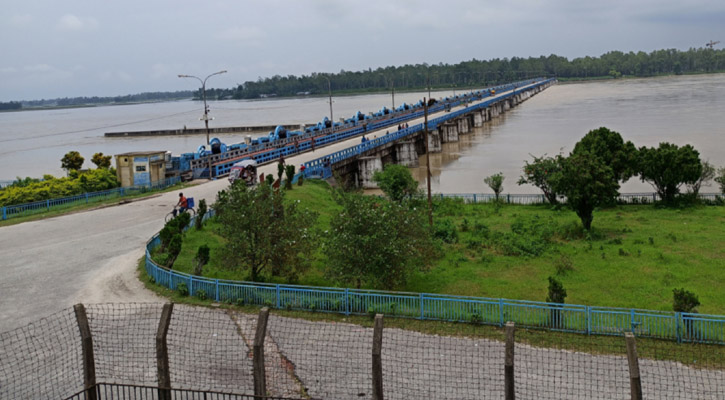Upstream hill slopes and heavy rains have increased the flow of water in the Teesta river and is flowing over the border. As a result, the lower area of Lalmonirhat on the left bank of Teesta river has been flooded.
At 6 am on Monday (August 14), the largest irrigation project in the country, Teesta Barrage Dalia Point of Hatibandha Upazila of Lalmonirhat recorded a water flow of 52.35 meters. Which (normal 52.15 meters) is flowing 20 cm above the boundary line.
People near the barrage and the river banks told Banglanews that the flow of Teesta river has increased due to heavy rains and hill slopes upstream for the past few days. All sluices of Teesta Barrage have been opened to control the flow of water.
The water started rising from Sunday morning. At Dalia Point at 6 am on Monday, Teesta water flowed 20 cm above the boundary line. Due to the increase in Teesta water flow in India’s Ghazaldoba, the upstream surge has increased the water flow at Dalia Point, the barrage authorities said.
The riverside people said that due to rising water, the low lying areas along the banks of Lalmonirhat district on the left bank of Teesta river have been flooded. Crop fields in low-lying areas are flooded. Hundreds of families have been waterlogged. The number of which is increasing gradually. Char area communication has already been cut off.
Azizul Islam of Char Govardhan area said that the water is increasing in Teesta since night. The low-lying areas along the river banks were flooded. Crop fields, roads and ponds are submerged. Communication is cut off by walking in the pasture. Boats have to be used to go from one house to another. Hundreds of thousands of families in the lower areas have been waterlogged.
Tamiz Uddin of Haldibari Char said that when the water in the river rises, the people of the Char area become waterlogged. There is a fear of flooding during monsoons. I have been stuck in water since the night. The water is gradually increasing. All around is water and water. The riverside people have to spend sleepless nights sitting on Machang with their families. In these areas, they are in extreme danger with children, old people and livestock.

